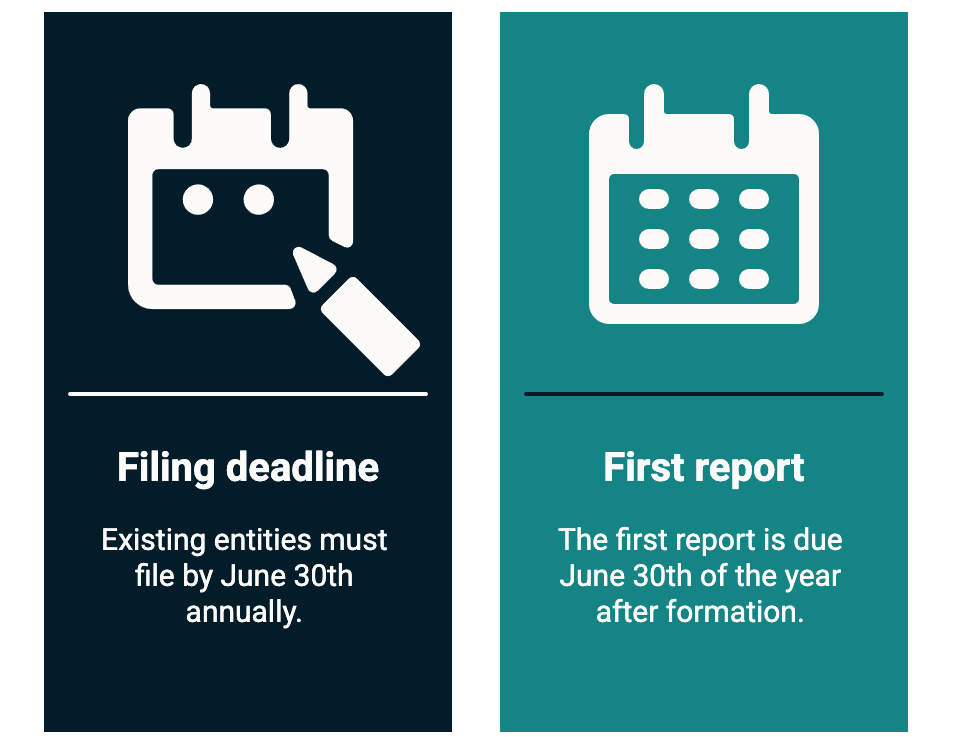Your Kentucky annual report is your business's yearly check-in with the state. It ensures your company remains legally operational and in good standing with the Kentucky Secretary of State.
The purpose is simple: tell Kentucky who's running your company and where you're located. This ensures that public records are accurate and that you're complying with the rules governing Kentucky businesses.
KRS 14A.6-010 requires all registered businesses to keep their information current through this annual filing. Failing to meet this deadline means your business will face administrative dissolution, resulting in the loss of its legal protections.
Most business entities operating in Kentucky are required to file an annual report, whether they're domestic entities formed in Kentucky or foreign entities formed elsewhere but authorized to conduct business here after completing a foreign registration.
The filing requirement applies to:
Each entity type files the same $15 annual report, though the leadership information required varies by entity structure. Sole proprietorships are exempt from the state annual report requirement. Since these aren't separate legal entities from their owners, Kentucky doesn't require annual reports from them.
Kentucky keeps things simple with no financial thresholds or revenue requirements. Your LLC, which made $10 million, files the same report as one with zero income. Even if your business sat completely dormant all year, you must file if you're a registered entity. The state doesn't care about your activity level—only your registration status.
The filing responsibility is flexible. Officers, directors, members, managers, or any authorized registered agent can submit the annual report on behalf of the entity. You don't need a certificate of good standing to file, which helps businesses stay compliant without bureaucratic hurdles.
Kentucky gives you two ways to file your annual report. Knowing how to file a Kentucky annual report correctly ensures timely compliance. Online filing is fastest, but you can stick with mail if that's your preference.
The Kentucky Business One Stop Portal gets your filing done in minutes:
You can print your annual report from the Secretary of State website or use the postcard the state mails in January and February. Then complete the following steps:
Mail processing time can vary depending on the Secretary of State's current workload.
Missing the deadline creates complications you don't want to deal with. Here’s a rundown of the key filing dates:

Here's what you need to know about timing: even if you formed your business in December, your first annual report is still due the following June 30th. The formation date doesn't matter, and the deadline remains the same.
Miss the June 30th deadline, and Kentucky lists your business in bad standing. You can still file your annual report to restore good standing, and there is no immediate penalty until after August 31st. While being in bad standing does not instantly prevent business operations, it can lead to legal complications if not resolved promptly.
Kentucky charges a flat $15 fee for all business entities.
While Kentucky doesn't charge late fees, failing to file by the deadline triggers administrative consequences that can cost significantly more.
Regardless of whether you’re filing online or by mail, you’ll need the following information:
Verify all information before submission, as outdated details create compliance issues and delay processing.
Kentucky's approach differs from many states—instead of charging late fees, they impose more serious administrative penalties. Here’s what you can expect:
The absence of late fees might seem beneficial, but the operational consequences and reinstatement costs make staying current with your Kentucky annual reports crucial for maintaining your business's legal status and protection.
The reinstatement process requires filing a reinstatement application with the Kentucky Secretary of State. After this, you’ll pay a $100 reinstatement fee, as well as all missed annual report fees ($15 per missed year). Then, wait for processing, which varies depending on the Secretary of State's current workload.
Do new businesses need to file an annual report in their first year?
No, you get a break in your first year of formation. Your first annual report is due by June 30 of the year following formation, regardless of when you incorporated or organized.
Are electronic signatures accepted on annual reports?
Yes, electronic signatures work fine for online filings through Kentucky's portal. No need to print, sign, and scan anything when filing electronically.
Can I change my registered agent information on the annual report?
You cannot update your registered agent's name and address directly on the annual report; instead, you must file a separate Statement of Change of Registered Agent and Office form.
Do I still need to file if my business had no activity?
Yes, all registered entities must file regardless of activity or income. Having zero business activity doesn't get you out of the filing requirement.
Discern automates Kentucky annual report filings and provides professional registered agent services across all 51 jurisdictions. Our platform tracks every deadline and handles submissions automatically, so you never scramble to meet another filing deadline.
Ready to simplify your compliance? Try Discern today.